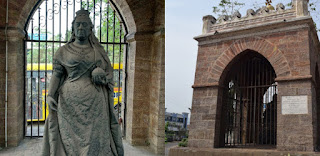 |
| Queen-Victoria-pavilion, Vizag. AP yovizag.com |
In this fast changing political scenario that changes in a jiff like the colourful patterns emerging in a kaleidoscope given a good shake, political leadership and monarchy are no exception to it. They get replaced by new leadership with better ideology and new governance. The British empire that had roots in India once controlled vast lands across the globe where the sun had never set. Now the empire is gone so are the people who were responsible for building the empire. India is no exception to it.
 |
| Queen-victoria-pavilion, Vizag. .hellovizag.in |
There are some statues of the the British royal family in India post independence and a preponderance of them and other colonial officials are shifted to the nearest museums where they take eternal rest under a thick cover of dust. Those still in public place receive little attention. A good example is the statue of queen Victoria near the harbor in Visakhapatnam city, Andhra.
The monument, which has a history of over 118 years in the city, is in a state disrepair for a long period. Queen Victoria Pavilion carries one of the oldest statues in Andhra Pradesh's Visakhapatnam and is one of the oldest made entirely of bronze. The Life-size statue was unveiled by the Collector and Governor's Agent, Visakhapatnam R.H. Campbell ICS on 24 May 1904 and Sri Akitam Venkata Jagga Row, a zamindar, presented the statue in honor of the Empress of India.
The equilateral structure constructed in fine ashlar stone masonry and set in an elevated cuboidal plinth can be accessed through a flight of steps all around. What is unique about this structure is it has selective features of Indo saracenic architecture - an ingenious blend of native Indian style and European design elements. A hemispherical ribbed dome surrounded by a parapet wall and miniature octagonal corner minarets, besides Greek crosses as decorative elements over the parapet impart a distinctive look to this pavillion. Atop the dome one can notice a finale adorned with a Greek Cross. The ribbed dome is supported by pointed Indo-Saracenic arches in the masonry walls. Above the saracenic pointed arches there is a thick band of embossed slabs up to the top. Meticulously finished, this kind of masonry work on a simple pavilion was first of its kind in Visakhapatnam. These features in steel were known in some places before.
The statue wearing a royal regalia and a crown with an orb in hand will never fail to grab our attention and it is a fine piece of work by the sculptor. The Sceptre the queen was holding disappeared long ago. Due to official apathy coupled with air pollution on account of coal dust from the nearby port the bronze statue has changed its form and turned black. Will the AP tourism department look into it and set thing right? The heritage site is pasted with all kinds of posters and the surrounding places are shappy. The site needs immediate attention by the city authorities.
https://www.hellovizag.in/place/queen-victoria-pavilio
https://www.researchgate.net/figure/Queen-Victoria-Pavilion_fig1_255171131
http://www.navrangindia.in/2018/05/the-historical-statue-of-queen-victoria.html
The_Selected_Colonial_Built_Heritage_in_Visakhapatnam_Andhra_Pradesh_India









